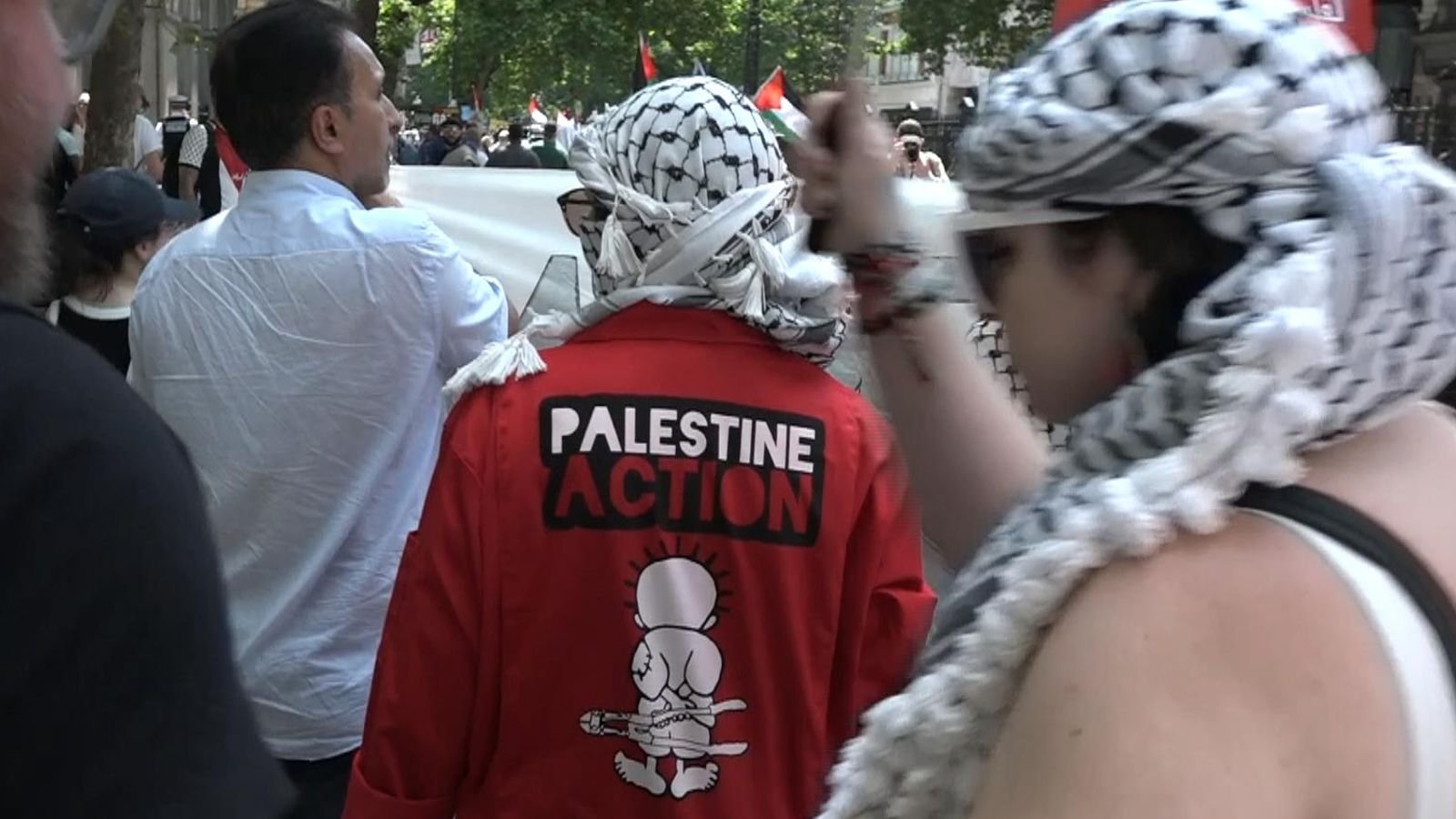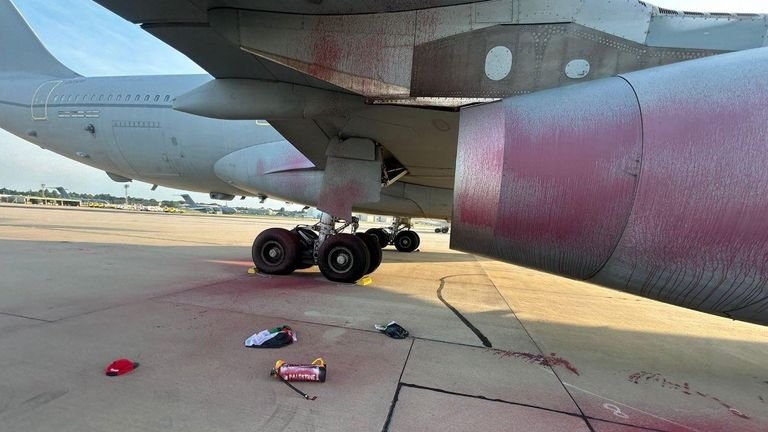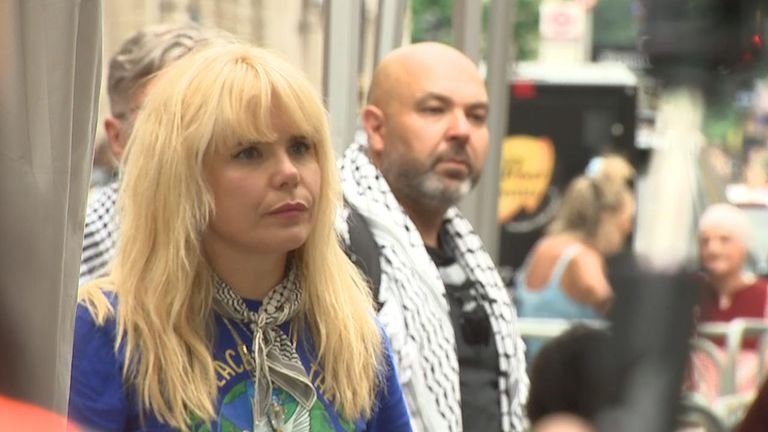The debate surrounding the impending ban on protest group Palestine Action has been split – labeled both «outrageous» and «long overdue».
Home Secretary Yvette Cooper is expected to make this move following the group’s infiltration of RAF Brize Norton in Oxfordshire on e-scooters and defacing two Voyager planes with red paint.
The prime minister condemned the attack as «outrageous» and a swift assessment of security at MoD bases is currently underway.
This incident is the most recent in a five-year campaign by Palestine Action (PA) targeting arms manufacturers, financial institutions, political figures, and government buildings.
The group has become known for using red spray paint as its signature mark.
According to its website, PA identifies as a «direct action movement» determined to halt «global participation» in what it refers to as Israel’s «genocidal and apartheid regime».
The group states that it employs «disruptive tactics» to target the «corporate enablers of the Israeli military-industrial complex».
If banned, membership in the group would become illegal, with it being classified as a terrorist organization.
Saeed Taji Farouky, a spokesperson for PA, expressed to Sky News that the potential prohibition was «unjust», asserting that it was «absurd» for a «civil society direct action group» to be on par with ISIS.
He further stated: «It’s illogical, it’s not even in line with the British legal definition of terrorism, it’s a decision that has been made abruptly, with minimal discussion or debate.
«The entire situation is extremely concerning, particularly for what it signifies about British law overall, undermining the very foundation of British democracy and the rule of law.»
He also clarified that under no circumstances would the two individuals who trespassed at Brize Norton be surrendered to the police.
Singer-songwriter Paloma Faith, who spoke at a pro-Palestine rally in Whitehall in central London on Saturday, expressed her dismay with the development.
«I have met some of the people who have friends in that group. They are young students and they are basically trying to do something because they feel that our government is failing them.»
She added that «everyone» wants to end what she described as a «massacre» in Gaza.
Israel says its military campaign in Gaza is a way of defending itself against Hamas, which killed more than a thousand people in its 7 October attacks and took about 240 people hostage. Hamas-run health authorities in Gaza claim that Israeli attacks have resulted in the deaths of nearly 56,000 people. Some have supported this claim, while others have criticized it. Lord Walney, the government’s independent adviser on political violence, stated in an interview with Sky News that the decision to ban protest group Palestine Action was «long overdue.» He emphasized that the group has been a source of internal conflict and should be cracked down upon. Walney pointed out that Palestine Action has been terrorizing working people for years and is facing serious violent charges in court. The UK government is expected to officially announce the ban early next week.
The impending ban on Palestine Action has sparked mixed reactions, with some calling it «outrageous» while others believe it is necessary. Home Secretary Yvette Cooper is likely to take action following the group’s recent break-in at RAF Brize Norton in Oxfordshire, where they vandalized two Voyager planes. Prime Minister Boris Johnson condemned the attack, prompting a review of security at MoD bases.
Palestine Action has been involved in a five-year campaign targeting various institutions and government buildings, using red spray paint as their signature. The group describes itself as a «direct action movement» aiming to end global support for Israel’s actions in Palestine. If banned, membership in Palestine Action would be considered illegal, and the group would be labeled a terrorist organization.
Saeed Taji Farouky, a spokesperson for PA, expressed dissatisfaction with the potential ban, arguing that it unfairly equates the group with ISIS. He criticized the lack of discussion or debate surrounding the decision and raised concerns about its implications for British democracy. Farouky stated that the individuals involved in the Brize Norton incident would not be handed over to the police.
Singer-songwriter Paloma Faith, who attended a pro-Palestine rally in London, expressed her disappointment with the ban. She defended the group, noting that its members are young students who feel let down by the government. Faith emphasized the need to address the situation in Gaza and called for an end to the violence. Hamas-run health authorities in Gaza have reported that nearly 56,000 people have been killed in Israeli attacks. This devastating toll underscores the ongoing conflict and violence in the region.
Non-violent protest has been a key component of many historical movements for social justice. Ben Jamal, director of the Palestine Solidarity Campaign, supports the use of non-violent protest by groups like Palestine Action. He draws parallels to past movements, such as the fight for civil rights in the US and the struggle against apartheid in South Africa, where non-violent direct action played a crucial role. Jamal emphasizes the importance of recognizing the legitimacy of non-violent protest in political movements.
In response to the actions of Palestine Action, Lord Walney, a former government adviser on political violence, has called for a crackdown on the group, describing them as the «enemy within.» He argues that Palestine Action has engaged in acts of terrorism and violence against working people, leading to serious charges being brought against them. The UK government is expected to make a decision on how to address the group in the near future.
The debate over the tactics used by Palestine Action reflects larger discussions around the use of non-violent protest in political movements. While some see non-violent protest as a legitimate form of expression and resistance, others view it as a threat to social order and stability. The decision on how to address groups like Palestine Action will have implications for the broader conversation around activism and dissent.
As the conflict in Gaza continues to escalate, the international community is watching closely. The high number of casualties from Israeli attacks is a stark reminder of the human cost of war. Efforts to find a peaceful resolution to the conflict remain ongoing, but the situation on the ground remains volatile.
In the midst of these challenges, voices calling for dialogue and diplomacy are more important than ever. The need for a peaceful and sustainable solution to the conflict in Gaza is urgent, and all parties involved must work towards a resolution that prioritizes the well-being of the people in the region.
As the world grapples with the ongoing crisis in Gaza, the importance of dialogue, understanding, and empathy cannot be overstated. The path to peace may be long and difficult, but it is essential that all efforts are made to end the violence and suffering in the region. Only through cooperation and compassion can lasting peace be achieved.
The impending ban on protest group Palestine Action has divided opinion – described as both «outrageous» and «long overdue».
Home Secretary Yvette Cooper is expected to take the step after the group broke into RAF Brize Norton in Oxfordshire on e-scooters and sprayed two Voyager planes with red paint.
The prime minister described the attack as «outrageous» and a rapid review of security at MoD bases is under way.
It was the latest protest in a five-year campaign from Palestine Action (PA) that has targeted arms manufacturers, financial institutions, political figures and government buildings.
Red spray paint has become its signature.
On its website, PA says it is a «direct action movement» committed to ending «global participation» in what it calls Israel’s «genocidal and apartheid regime».
It adds that it uses «disruptive tactics» to target «corporate enablers of the Israeli military-industrial complex».
Banning the group would make membership of it illegal. It would be treated as a terrorist organisation.
Saeed Taji Farouky, a spokesman for PA, told Sky News that potential proscription was «unfair», adding that it was «ludicrous» that a «civil society direct action group» could end up on the same list as ISIS.
He added: «It’s not logical, it’s not even consistent with the British legal definition of terrorism, it’s a reaction that’s been taken overnight, with almost no discussion or debate.
«The whole thing is incredibly worrying, mostly for what it means about British law in general, about undermining the very basis of British democracy and the rule of law.»
There are «no circumstances» under which the two people who breached Brize Norton would be handed over to the police, he said.
Singer-songwriter Paloma Faith, who spoke at a pro-Palestine rally in Whitehall in central London on Saturday, told Sky News she was «devastated» by the move.
«I have met some of the people who have friends in that group. They are young students and they are basically trying to do something because they feel that our government is failing them.»
She added that «everyone» wants to end what she described as a «massacre» in Gaza.
Israel says its military campaign in Gaza is a way of defending itself against Hamas, which killed more than a thousand people in its 7 October attacks and took about 240 people hostage.
SOURCE




